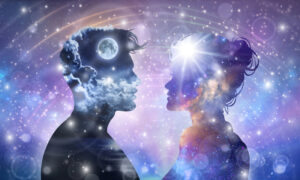
By Jakeb Brock
The prevailing scientific view is that we human beings are biological creatures of the earth and that our present place of supremacy among the other earthly species is the result of a biological evolutionary thrust, out from which we emerged with strong supple bodies and highly developed minds. This is, in fact, according to science, the summation of all there really is to know about us. As for the complexities of human life that we are all so familiar with, these are actually illusory and imaginary—that is to say, they are nothing more than the byproducts of our overactive, highly developed brains. Our emotions, thoughts, and layered behaviors all have a biological basis, in that they are all activities of mind. Therefore human life is not complex in reality. It only seems that way to us because our minds tend to work unchecked and be overactive.
Also according to this view, the only true knowledge is empirical knowledge. In other words, it is knowledge arrived at through the discovery and study of “the real.” And what is the real? It is only that which can be perceived with our five biological human senses: seeing, hearing, touching, smelling, and tasting. Everything else that we call knowledge, such as ideas, intuitive deductions, and instinctual awareness is, in fact, inappropriately called knowledge because it is not arrived at through empirical processes. Rather it is mentally conceived and enhanced—that is, it is just mind stuff.
This then describes human life in a nutshell. Once we are able to delineate between and separate the real from our indulgent mind stuff complexity will cease to be part of the human experience, and what we will be left with will be a very streamlined and basic worldview. This is where the scientific community would like to take us, but we seem to be dragging our heels and resisting their prodding.
Our recalcitrance in this matter has caused more than one scientist to scratch his head in perplexity. Even some who are not a part of the scientific community find it to be a curious phenomenon. For, the only plausible explanation is that we are for some reason attached to our own suffering and complexity. And there is perhaps also a fear factor at work. We fear that the pure pragmatism of the scientific view would ultimately reduce us to clone-like automatons. True, in that scenario we would no longer have the problems and difficulties that we have now. But neither would we have passion, ideals, imagination, dreams, etc. Once we got a handle on our superfluous mind stuff and were able to rein it in and relinquish it, human life would become one hundred percent biological—a biology that would still elevate us above the other species but would no longer include the entire element of mental projection that we now so freely indulge in.
And so science has the enigmatic distinction of being both our savior and our worst enemy at the same time. It is our savior because it is laboring to move us into a saner, more pragmatic reality, but it is our worst enemy because in order for us to lay hold of its brand of salvation we would need to relinquish our attachment to all the added elements that we associate with living a rich and full human life at present.
Since we cannot fully embrace the salvation that science offers and remain attached to our present way of going about things, the choice before us then becomes painfully clear: Do we want to trade our present sufferings and sometimes overwhelming complexities for a purely biological existence? We have put our trust in science and technology, and this is where it has brought us. Even now our complexities, while still indulged on the level of “quaintness,” are being exposed as non-essential mental pandering. Even now our attachment to them is steadily eroding. Even now those who are still clinging to the “old way” are being treated as dinosaurs. Even now human life, as we have known it, is slipping into obsolescence. Thus the fate of the human experience now hangs in the balance.
What is perhaps most poignant about this crossroads we have come to is that it never had to come to this. It was not a predestined, inevitable outcome to the human story. Rather it has come to pass for two primary reasons. First, the masses of humanity have always seen themselves unworthy of and shunned enlightenment. And second, we have willingly turned our fate over to those that we considered to be well-educated experts and commissioned them to guide us towards a better life. Thus we have no one to blame but ourselves. These two age-old collective dynamics have brought us to our present point of impasse, and their correction is what needs to happen in order for us to get back on the right track. The masses must take on the responsibility of individual enlightenment, and then, if we still have the need for them, we must appoint truly enlightened men and women to lead us. As it has been up until now, human society has been characterized by the proverb: the blind leading the blind.
Besides this proverbial comparison being applicable to our present condition, it also points to the fact that these things have not come to pass without warning. There have, in fact, been numerous warnings given us. A veritable plethora of prophets and seers have foreseen these days and urged us to change our direction. But our masses have persisted in their sloth and ignorance, and our scientists have dismissed the entire lump sum of warnings as the rantings of madmen because they were not empirical in nature.
The question we must now ask ourselves is: Did those who tried so earnestly to warn us know something that we do not? For, either they were indeed madmen or they understood something about human life that we have still yet to learn (or have forgotten). There can be no other deduction to make about their actions.
So let us suppose for a moment that they were not simply mad. Instead let us humble ourselves and ask: What might it be? What might they have known? Based on their earnest approach, they were obviously compassionate human beings who cared deeply about their fellowman. But even more than that, their actions speak of knowledge. It was as if they had a key that unlocked the entire mystery of human life—one truth about the human makeup that would cause everything else to come into focus; one revelation, which once collectively acknowledged and integrated would bring true sanity and goodness to the human scene, instead of delivering us onto the shoals of despair. Through their pragmatism our scientists have perpetually upheld empirical process as the only legitimate form of knowledge. But they have also steered us to the brink. Meanwhile, the discoveries and secrets of the ancient spiritual masters promise to take us in the exact opposite direction.
In approaching these matters we must first let go of the prejudices we have adopted about the vehicles that were used to make the teachings of the ancient masters known to the world. These prejudices are largely the result of having allowed scientific pragmatism to hold sway over human society. Most of the testimony of the ancient seers was passed down to us through what are now considered to be religious texts. But as it turns out, their knowledge—the knowledge we are missing—was not the least bit religious. It was, in fact, scientific.
The science pertaining to man, as we now know it, is strictly biological. But the ancients were in possession of a thriving science that transcended biology. This science is the study of human consciousness. Our scientists certainly acknowledge the phenomenon of consciousness, but they have refused to embark upon its study because consciousness is not perceptible by the five human senses and therefore cannot be approached from an empirical angle. It is not biological; it is spiritual. And spirit has no basis in biology.
Spirit is the substance of the ether. It is not of the earth and does not belong to the physical universe. In fact, it has no connection to the physical aspects of our universe whatsoever. Human beings, however, possess the capability of perceiving spirit. But because it is not biological, our approach to its study has for the most part drifted into the realm of religious mysticism. In order to perceive spirit human beings have needed to develop a sixth sense—a sense that the religious mystics call faith.
Faith is the vehicle of perception, by which human beings can perceive and study the ethereal realm and its substance: spirit. Though science recognizes the ethereal realm as extant, it refuses to acknowledge faith as a legitimate sense of perception. Thus science has concluded that the ethereal realm exists but is imperceptible to human beings.
But the ancients saw faith in a different light. For them, it was as much of a valid human sense as seeing or hearing. The only difference in their minds between faith and the five physical senses was that faith needed to be willfully cultivated. Its essential functional capability was within us, but it had to be uncovered and brought to life by an act of the human will. It was a given aspect of our created makeup just like the other senses but was buried deep within the psyche and remained so until we dug it up, brushed it off, and fanned it into flame. The ancients did this routinely and with amazing results. Thus it was said of them that they lived by faith and not by sight.
Faith was their vehicle of perception but it was not the faculty by which they came to understand the nuances of spirit. By faith they perceived the ether or spiritual realm. But they used another faculty to study and interact with that realm—the faculty of spiritual consciousness. Where did they get such a faculty? That was the easy part, since every human being is born with this faculty. What the ancients learned to do (and we largely have not) is to use spiritual consciousness for the purposes it was intended for.
Most of us view our endowment of consciousness erroneously. We confuse it with a function of mind. In other words, we have come to believe that when we are experiencing consciousness we are simply using a part of our mind. One of the reasons for this is that the scientific community has elevated the function of mind above all other functions of the human psyche. It has rendered mind as an all-inclusive biological endowment. Even the body is seen in this light. It is not separate from mind, but is actually a physical aspect of mind. So when we hear about consciousness, most of us immediately associate it with mind. But the ancients delved much more deeply into this matter, and they discovered something very important: Human consciousness is not a function of mind. It is an altogether separate function of the human psyche. Why did they deem this distinction to be so important? For one thing, it meant that the human psyche was much more expansive than previously thought. The theory that all human functions are contained in mind and are therefore biological in nature is a highly limiting one. But the ancients discovered that mind is not the only function operating in the human psyche. Neither is it even the most dominant function of the psyche. It is a biological function that resides in the psyche, as is body. But the human psyche is also home to spiritual consciousness, and this function is eternal and has no limitations. As spirit, it is in no way restricted by biological properties. Therefore according to our created blueprint spiritual consciousness not only resides in the human psyche; it is meant to rule therein.
The scientific community has never acknowledged spirit as extant because it has not been able to perceive spirit with our five biological senses. It has acknowledged consciousness, but only as an aspect of mind. But to the ancients, spirit and consciousness were one. And through faith they not only perceived this function of the human psyche; they also were able to learn a great deal about it. Thus it was the study of consciousness that became their main focus and made them wise beyond our reckoning. For, to know the truth about consciousness in relation to the psychic functions of body and mind is to unlock the entire mystery of human life. It represents the correct reintegration of the human psyche, by which the optimal health and function ability of a human being is achieved.
But the ancients went even further than this. Through their study of consciousness they also discovered the true purpose for why we are here. They saw that not only was consciousness spiritual; it was also evolutionary in nature. This was in harmony with their study of the natural world around them, in which it was found that many of the earth’s created life forms were evolutionary. But the unique quality about man was that man’s evolutionary thrust was not biological; it was spiritual. Man did not evolve from one earthly species into a new one. Only his faculty of spiritual consciousness displayed this propensity. And it was this created endowment of evolving spiritual consciousness that gave man dominion over all other created life forms—not some aspect of biological supremacy. This is what the Bible means when it says that we were created in the image of God. God is fully evolved consciousness. And human beings were created with the evolutionary capacity for becoming like God.
Furthermore, the ancients deduced that consciousness evolution was the true purpose of human life. This was actually an obvious finding for them. For, what purpose could ever compare to becoming like God? But in order for consciousness to evolve it needed time and experience on the earthly plane. And this matter of earthly plane experience was neither obvious nor simple. In fact, it has been shown to be highly complex and enigmatic. That was why the earthly plane environment was created to be a naturally challenging one, presenting us with obstacles, pressures, oppositional forces, and inertia. These experiential elements act like fire to our endowment of consciousness, burning away all resistance to the evolutionary process.
And so we come to find that the complexities of human life are not superfluous after all. They are not just indulgent mind stuff that we cling to in order to make life
more interesting and intriguing. Rather they are the product of our own experiences, as we interact with the challenging aspects of the earthly plane environment. They are purposeful, in that they actually facilitate our evolutionary impulses.
If there were no evolution of consciousness then the scientific view that human life is dominantly biological would be correct, and all of our complexities would, in fact, be indulgent mind stuff. But the ancients knew that consciousness was not only a non-biological endowment; it was the only faculty of our created makeup that is evolutionary. They also recognized that suffering and complexity were elements of earthly plane existence that facilitated man’s evolutionary thrust.
One of the main motives of the scientific community has always been to alleviate and eradicate suffering. And their efforts have not been limited to their teachings. They have branched out into other more tangible methodologies, such as psychological conditioning and medical therapies. In these attempts they wholeheartedly believe that they are performing a great service to humanity. But the ancients knew that to eradicate suffering and do away with complexity would actually be counterproductive to consciousness evolution. It would remove one of the most efficacious influences on our journey toward evolutionary fulfillment.
Due to erroneous counterproductive programs such as these impacting human society, severe restraints have come upon our evolutionary instincts. Collectively, in fact, our entire evolutionary impetus has been derailed. And this is not a new phenomenon. It has been going on since the beginning of the age. Fortunately, this does not hold true for the individual. As individuals, we are still capable of growing spiritually and realizing our ultimate evolutionary fulfillment. This enduring individual capability is the pearl of great price that Jesus spoke of. If it ever gets taken away from us, human life will indeed be altered unrecognizably. Not only will our complexities become a thing of the past, but also spiritual life will become perpetually off-limits to us. Human consciousness will forever after be viewed as a function of mind, thereby rendering its expansive properties null and void. Indeed we will become nothing more than biological automatons.
Jakeb Brock is a spiritual teacher and the author of The New Consciousness: What Our World Needs Most. Visit www.ournewconsciousness.com or www.facebook.com/thenewconsciousness.
 Conscious Community Magazine Dedicated to Elevating Consciousness
Conscious Community Magazine Dedicated to Elevating Consciousness



